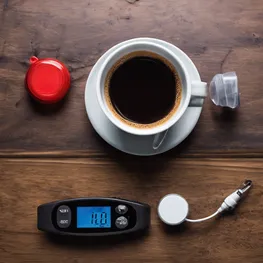Table of contents
- Weather and Blood Sugar Levels: What You Need to Know
- Stay Cool and Keep Your Blood Sugar in Check
- The Impact of Cold Weather on Blood Sugar Control
- Uncovering the Impact of Humidity on Blood Sugar Fluctuations
- Weathering the Storm: Tips for Managing Blood Sugar
- The Final Verdict
The weather plays a significant role in our daily lives, affecting everything from our mood to our activities. But did you know that it can also impact our blood sugar levels? In this article, we will explore the fascinating connection between weather conditions and blood sugar stability. Understanding how temperature, humidity, and other weather factors affect our glucose levels can help individuals with diabetes better manage their condition and maintain optimal health. So, grab your umbrella and join us as we delve into the intriguing world of weather and blood sugar.
Weather and Blood Sugar Levels: What You Need to Know
Weather can have a significant impact on our daily lives, from influencing our mood to affecting our activities. But did you know that the weather can also impact our blood sugar levels? Understanding the relationship between weather and blood sugar stability is essential for individuals living with diabetes. Here are some key points to consider:
-
Temperature and Insulin Sensitivity
Extreme temperatures, whether hot or cold, can affect how our bodies respond to insulin. In hot weather, blood vessels may dilate, leading to faster insulin absorption and potentially causing low blood sugar. Alternatively, cold weather can narrow blood vessels, slowing insulin absorption and leading to higher blood sugar levels.
-
Humidity and Hydration
Humidity can impact blood glucose levels by affecting hydration levels. High humidity may lead to excessive sweating, causing dehydration and potential fluctuations in blood sugar. It is crucial to stay well-hydrated in humid weather to maintain stable blood sugar levels.
-
Barometric Pressure and Blood Sugar
Changes in barometric pressure, often associated with weather changes like storms or altitude variations, can influence blood glucose levels. Some individuals with diabetes may experience changes in insulin requirements during these times. Regular blood sugar monitoring and adjustments in medication may be necessary.
-
Seasonal Factors
Seasonal changes in weather can impact blood sugar stability due to variations in activity levels and dietary patterns. For example, during colder months, people tend to be less active and may indulge in more comfort foods, which can lead to higher blood sugar levels. It is important to adapt diabetes management strategies to account for seasonal changes.
-
Sunlight and Vitamin D
Sunlight exposure is essential for the production of vitamin D in the body. Vitamin D deficiency has been linked to insulin resistance and higher blood sugar levels. During periods with reduced sunlight, such as winter, individuals with diabetes should monitor their vitamin D levels and consult their healthcare provider for appropriate supplementation if needed.
Stay Cool and Keep Your Blood Sugar in Check
During hot weather, it is important to manage blood sugar levels by staying cool and hydrated. Avoid prolonged sun exposure, dress in lightweight clothing, and drink plenty of water to prevent dehydration and maintain stable blood sugar levels.
The Impact of Cold Weather on Blood Sugar Control
Maintaining stable blood sugar levels in cold weather is crucial for individuals with diabetes. The impact of cold weather on blood sugar control can be significant, as the body responds to colder temperatures in various ways. Here are some strategies to help you maintain stable blood sugar levels during the colder months:
-
Monitor Blood Sugar Levels
Regularly monitor your blood sugar levels to stay aware of any fluctuations. Cold weather may affect your body's insulin sensitivity, so it's essential to keep a close eye on your readings and adjust your medication or insulin doses accordingly.
-
Dress Appropriately
Dress in layers to stay warm and protect yourself from the cold. This will help prevent your body from using extra energy to keep warm, which can lead to a drop in blood sugar levels. Wear insulated clothing and ensure your extremities are well-covered to avoid circulation problems.
-
Stay Hydrated
It's easy to forget to drink water during colder weather, but staying hydrated is crucial for maintaining stable blood sugar levels. Dehydration can cause blood sugar levels to rise, so drink plenty of water throughout the day.
-
Be Mindful of Comfort Foods
Cold weather often tempts us to indulge in comfort foods, which are often high in carbohydrates and can cause blood sugar spikes. Choose nutritious, balanced meals and snacks to keep your blood sugar levels steady.
-
Exercise Indoors
If it's too cold to exercise outdoors, find indoor activities to keep yourself active. Regular exercise helps regulate blood sugar levels, so try options like dancing, yoga, or home workouts to stay physically active.
-
Manage Stress Levels
Cold weather and shorter daylight hours can contribute to increased stress levels, which can impact blood sugar control. Find stress-management techniques that work for you, such as deep breathing exercises, meditation, or engaging in hobbies that bring you joy.
-
Consult with your Healthcare Team
Discuss any concerns or changes in your blood sugar control with your healthcare team. They can provide personalized guidance and help you make any necessary adjustments to your diabetes management plan in response to the colder weather.
Uncovering the Impact of Humidity on Blood Sugar Fluctuations
Humidity can impact blood glucose levels by affecting insulin absorption and metabolism. High humidity can lead to insulin resistance, causing blood sugar fluctuations. It is important for individuals with diabetes to monitor their blood sugar levels closely during periods of high humidity.
Weathering the Storm: Tips for Managing Blood Sugar
Storms can have a significant impact on blood sugar control, particularly for individuals with diabetes. Changes in weather, such as high humidity, extreme temperatures, and barometric pressure fluctuations, can affect insulin absorption and metabolism. Additionally, storms can disrupt daily routines, making it challenging to adhere to regular meal plans and medication schedules. Power outages and limited access to food and medication during storms can also pose unique challenges. As a result, individuals with diabetes should closely monitor their blood sugar levels, have an emergency plan in place, and seek prompt medical attention if necessary during storm events.
The Final Verdict
Monitoring and adjusting blood sugar management strategies based on weather conditions is crucial for individuals with diabetes as weather changes can impact blood sugar levels. Hot weather can lead to dehydration and increased insulin absorption, potentially causing low blood sugar. Cold weather, on the other hand, can lead to insulin resistance, resulting in high blood sugar levels. By tracking and adapting their management strategies according to the weather, individuals can maintain stable blood sugar levels and prevent complications.
In conclusion, the influence of weather on blood sugar stability is an important factor that individuals with diabetes should consider. Extreme temperatures, humidity, and changes in atmospheric pressure can all affect blood sugar levels and potentially lead to fluctuations. It is crucial for those managing their diabetes to monitor their blood sugar levels more closely during weather changes and adjust their medications or insulin accordingly. Understanding these influences and taking proactive steps can help individuals maintain stable blood sugar levels and effectively manage their condition, ensuring optimal health and well-being.
Frequently asked questions related to weather and blood sugar stability
How does weather affect blood sugar stability?
Weather can affect blood sugar stability in several ways. For example, extreme heat or cold temperatures can cause fluctuations in blood sugar levels. Additionally, changes in barometric pressure, humidity, and sunlight exposure can also impact insulin sensitivity and metabolism, leading to changes in blood sugar levels.
How does barometric pressure affect blood sugar stability?
Changes in barometric pressure can impact blood sugar stability. When the barometric pressure drops, it can lead to lower oxygen levels in the blood, affecting insulin function and glucose metabolism. This can result in elevated blood sugar levels. Conversely, when the barometric pressure rises, it may enhance insulin sensitivity, leading to lower blood sugar levels.
Can cold weather affect blood sugar levels?
Yes, cold weather can affect blood sugar levels. Cold temperatures can cause vasoconstriction, reducing blood flow to the extremities and impacting insulin absorption. This can result in higher blood sugar levels. Furthermore, reduced physical activity and increased calorie intake during colder months can also contribute to blood sugar fluctuations.
Can sunlight exposure affect blood sugar levels?
Yes, sunlight exposure can affect blood sugar levels. Sunlight helps stimulate the production of vitamin D, which plays a role in insulin secretion and glucose metabolism. Additionally, spending time outdoors and being physically active under the sun can contribute to better blood sugar control. However, excessive sun exposure without proper protection can also lead to dehydration and heat stress, which can affect blood sugar levels.
Does humidity affect blood sugar stability?
Humidity can affect blood sugar stability to some extent. High humidity can make it more difficult for sweat to evaporate, causing the body to retain heat. This can lead to increased insulin resistance and higher blood sugar levels. However, the impact of humidity on blood sugar stability may vary from person to person.
Does hot weather affect blood sugar levels?
Yes, hot weather can affect blood sugar levels. High temperatures can increase the risk of dehydration, which can lead to higher blood sugar levels. Additionally, excessive sweating can cause electrolyte imbalances, affecting blood sugar regulation. It's important to stay hydrated and monitor blood sugar levels closely during hot weather.







